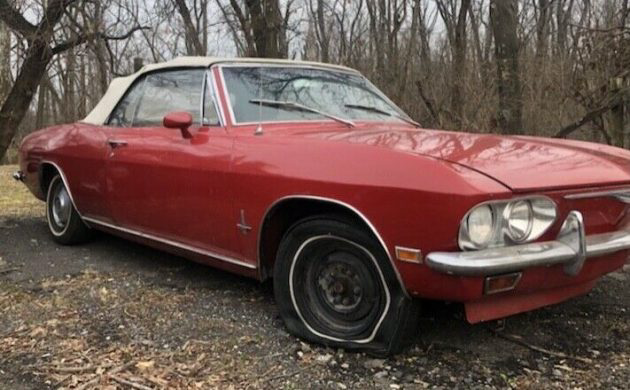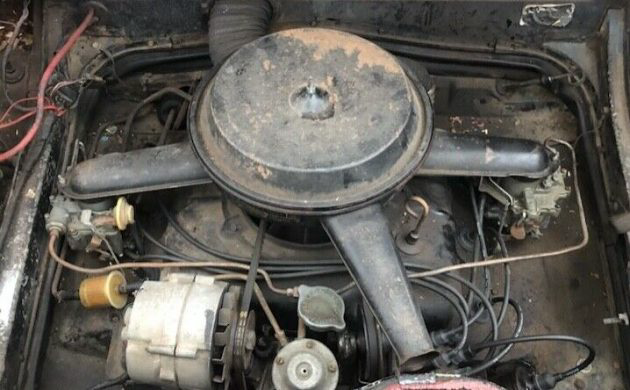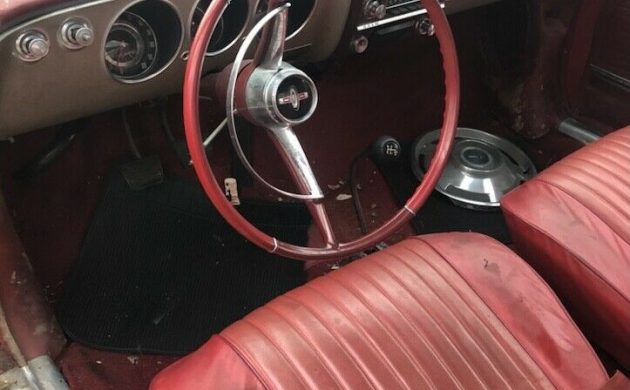Air-Cooled Garage Find: 1965 Chevrolet Corvair
Now and then, U.S. automakers think out of the box and produce something different. One example of this is the Chevy Corvair, with its rear-mounted, air-cooled engine that was unlike anything else on the mass market in 1960, except for the VW Beetle. Earlier Corvairs were noted for their tendency to oversteer due to lighter weight in the front, which caught the attention of safety activist Ralph Nader, who authored a book on the subject. This 1965 Monza convertible is from the car’s second generation when most of the safety concerns had been resolved. It’s been off the road for three years and needs someone to get it running again. Located in Fort Washington, Pennsylvania, this Corvair is available here on eBay where the no reserve auction has been bid up to $3,550.
Nader’s book, Unsafe at Any Speed, was published in late 1965 and contributed to Corvair sales dropping by 50% for the 1966 model year. In the meantime, the Corvair enjoyed a bit of a sales rebirth due to its restyle, with production increasing from 207,114 to 237,056 units in ‘65. Of those, 26,466 were the upscale-trimmed Monza convertible, like the one seen here. This car is being offered by a dealer who found it in a garage where it had been running when it was parked three years earlier.
This is not a drivable car, but hopefully, it won’t take a lot to change that. The flat six-cylinder may have a fuel delivery issue from sitting, so the buyer will need to address that along with the battery, tires, brakes, and other things that are needed to make a car “go” on a regular basis. At under 89,000 miles, this Corvair looks to have a lot of life left with some TLC.
The red paint is thought to have been redone at some point and there is rust present, but not necessarily excessive. It’s found its way into the front floorboards and the center of the trunk, not difficult places to access for repairs. The interior and convertible top are quite presentable in their current state. The title is listed as “salvage” in the listing, but the seller says that’s not accurate. The previous owner lost the title and we’re told the seller has the paperwork needed for you to correct this with your state’s DMV. With any luck, this could be a daily driver kind of car without breaking the bank. And be something you don’t see every week and Cars & Coffee.
Auctions Ending Soon
 2006 Ford Mustang Saleen S281 SCBid Now4 hours$16,000
2006 Ford Mustang Saleen S281 SCBid Now4 hours$16,000
 2002 Subaru Impreza WRXBid Now3 days$333
2002 Subaru Impreza WRXBid Now3 days$333
 1975 Chevrolet Corvette ConvertibleBid Now3 days$3,000
1975 Chevrolet Corvette ConvertibleBid Now3 days$3,000
 1964 Ford F-100 Camper CustomBid Now3 days$2,000
1964 Ford F-100 Camper CustomBid Now3 days$2,000
 2006 Jeep Wrangler SportBid Now5 days$10,500
2006 Jeep Wrangler SportBid Now5 days$10,500





Comments
The American Porsche
Looking at the pictures posted on eBay I’m seeing a tired Corvair. One repaint on a car that has resided in a salt state would make the current bid to be the high water mark for this car. The structure is in the rockers and having rust in the floors makes me believe the paint is hiding other rust issues. Consider what you are buying and your maximum amount you want to invest. There are enough examples out there that it would be a better choice to buy one fixed up and with a good pre-purchase inspection. If you are close enough and want a project that you can finance repairs as you go then this could be a good starting point. Just keep in mind you will spend 20K to make this nice at a minimum unless you are a good body and paint guy.
As far as Ralph Nader we give him more credit for killing the Corvair than he deserves. It was the Mustang and other compact that came to market during the mid to late 60’s that made the Corvair fall out of favor as well as reliability and its unconventional design. And as far as the early model being unsafe I believe Hagarty did a video using the same Corvair in question and he was unable to make it roll.
That being said the late model Corvair is probably one of the best handling domestic car the era and parts are plentiful as compared to other classics.
Alphasud,
Your comments are very accurate, I’ve owned several ‘vair convertibles, some incredibly rusted, a couple without body rot. Vair Nut explains where to look for critical rust areas in his comment below, so I won’t bother, as his info is spot-on.
There is one additional plus to this car, not mentioned in the ebay ad or here; based on the shift knob, it’s a 4 speed, not 3 speed. That pointed out, I would be asking the seller if he’s checked to confirm it’s a 4-speed, as it’s not mentioned [it’s way too easy to change the shift knob, to make it appear it’s a 4 speed].
If it’s a 4 speed gearbox, and the new owner decides the engine is a bit tired, when rebuilding the engine, they should consider adding the factory 4-carb setup. A Corvair with 4 speed and 4-carb specs is a potent vehicle and very fun to drive. I had a blue version of this car with the 4 X 4 combination, and it was a pleasure to drive, top up or down.
Good thing about oily air cooled cars is the engine can sit for a long while without locking up. I owned both early and late Corvairs in the 70’s and can vouch for the handling differences- two near death experiences in the ’62 Monza and a ‘Vair powered dune buggy, none in my ’66 with factory AC. It was a great handling car with super light non power steering and cornered like a ‘Vette.
I grew up with, and still drive corvairs. They are all unibody. It’s not the visible rust that you should be concerned with, it’s the rust you can’t see without a thorough inspection. Specifically the front cross member, shock towers, door posts, floors and above the gas tank / around the windshield and under the rear seat. And I am sure that car has seen some water inside as it’s a rag top and getting caught in the rain can leave everything wet, musty and rusty inside, most where you can’t see. Beware.
Even the first edition in 1960 were great cars – I drove one a lot, kept the tire pressures correct, something like 16 in the front and 32 in the rear, it never tried to spin out and was MUCH more tractable than my uncles’s early Porsche 911 which, at speed, was as squirrely as they come and a chore to drive any distance on the highway. A anti-swayr bar, apparently included in the original design, was “value engineered” out until the ’64 models, and the ’66 – 68’s were wonderful on the road, with the bigger engine, and, if you could get one, with John Fitch’s modifications.
You rarely see garaged Barn Find Corvairs. They’ve either been restored, gutted for the engine, or gone to the crusher. Sad.
That said, I have a ’67 Monza you can find in my garage. LOL
“Ran when parked” is a meaningless comment.
And get that fuel filter out of the engine bay! With Corvairs, it’s never a good idea to have rubber fuel hoses in the engine bay, where temps can get quite high. Many engine fires have started as a result. The best places for a fuel filter on a Corvair is right after the fuel tank or on the other side of the firewall from the engine.
Corvairs are just plain fun, I’ve had a few. The white car is a Crown mid-engine conversion with a 350, and I picked up the 66 convert about 6 months ago. The convert is a Los Angeles built Monza with the 140/4 speed and factory air. It also a very low mileage car, but missing a couple AC components. I bought it because the structure of the car is so solid. With the exception of pinholes in the trunk floor, a small area of the lower right front fender, and the battery tray area, it is virtually rust free. As mentioned, the rockers are the main concern on these cars. There is a great Corvair community, and parts are widely available.
Why does this 65 Monza have the 68-69 side marker lights??
They look similar to the 68-69, but I bet they are aftermarket (Pep Boys, JC Whitney). The GM units have more rounded corners. It was fairly common to add side light to 67 and older cars after the feds mandated them beginning in 1968. I remember my dad adding a set of 68 Buick side markers to our 67 LeSabre just after they were introduced.